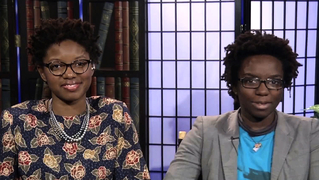
Related
Guests
- Tori Wolfe-Sissonher marriage to Shanté Wolfe-Sisson made history when they became the first same-sex couple to marry in Montgomery, Alabama. She is the field organizer for Human Rights Campaign Alabama.
- Shanté Wolfe-Sissonher marriage to Tori Wolfe-Sisson made history when they became the first same-sex couple to marry in Montgomery, Alabama.
We end today’s show looking at another fight for civil rights in Alabama: marriage equality. On Monday, Alabama Attorney General Luther Strange asked a federal judge to keep legalizing same-sex marriage in the state on hold until the U.S. Supreme Court rules later this year. Last month, Alabama became the 37th state to allow same-sex marriage, but the Alabama Supreme Court directed probate judges to stop giving licenses to same-sex couples. In Selma on Sunday, Amy Goodman spoke to Tori and Shanté Wolfe-Sisson, the first same-sex couple to marry in Montgomery, Alabama.
Transcript
AMY GOODMAN: We wrap today on looking at another fight for civil rights in Alabama. On Monday, Alabama Attorney General Luther Strange asked a federal judge to keep same-sex marriage in the state on hold until the U.S. Supreme Court rules later this year. Last month, Alabama became the 37th state to allow same-sex marriage, but the Alabama Supreme Court directed probate judges to stop giving licenses to same-sex couples. In Selma on Sunday, I spoke to the first same-sex couple to marry in Montgomery, Alabama.
TORI WOLFE-SISSON: My name’s Tori Wolfe-Sisson, and we’re outside of Brown Chapel in Selma, Alabama.
SHANTÉ WOLFE-SISSON: And I’m Shanté Wolfe-Sisson. And we’re here for Selma weekend.
AMY GOODMAN: Shanté and Tori, we’re here on the 50th anniversary of the observance of Bloody Sunday. People are talking about voting rights, the right to be heard. This also happens to come a few days after the Alabama Supreme Court has put a halt to marriage equality in Alabama. You were the first couple to get married in Montgomery, the first same-sex couple. Your response to this and how it relates to this weekend?
TORI WOLFE-SISSON: So, it’s really hard to tie it together. They’re kind of parallel, but not really perpendicular, issues. And considering the fact that now we—no other couples can be married, this makes it bittersweet. We’re not really able to enjoy the fact that we’re married, because, one, all of our rights were just stripped, and, two, there are so many people who would like to be wed, and that opportunity is no longer there.
AMY GOODMAN: Can you talk about marriage equality as an issue of civil rights, civil rights which is so much the buzzword this weekend?
TORI WOLFE-SISSON: Yeah. It’s interesting, because a lot of the people that want to strip our rights don’t really understand what they are. When people talk about marriage equality and same-sex marriages, they think about the sexual nature of it, but they don’t really understand what those rights are and what rights we don’t have and what rights we’re fighting for. So, in the state of Alabama, there’s no accommodations protections. There’s no—people can be fired for being same-gender-loving individuals. There’s—I’m missing something, I’m sure, but there are so many things that we don’t have. And so, marriage equality, that means that if I—if one of us goes to the hospital, I would be able to check on her without any issue. If we wanted to adopt, there’s laws on the books that you have to be married to have second-parent adoptions, and that’s part of, like, the original deal. So, there’s a lot of protections that we’re not afforded, and people don’t understand that when they’re trying to deny them.
SHANTÉ WOLFE-SISSON: And looking at it from a civil rights aspect, if you’re about liberation, you have to be about liberation for all people. That’s the closest that everyone should be able to tie the two together, because often, more so than not these days, people are trying to romanticize—you know, “Oh, marriage equality is the new civil rights.” It is a civil rights issue, but you shouldn’t, like, try to replace something that has already happened in history.
AMY GOODMAN: Is there any message you would like to leave with the Alabama state Supreme Court chief justice, Roy Moore, who told judges not to issue same-sex marriages when it was legal and now, well, has put a halt to same-sex marriage in Alabama?
TORI WOLFE-SISSON: Let’s be clear: For someone with privilege, it makes absolutely no sense to deny anyone else those privileges that you’re afforded.
AMY GOODMAN: Will you be walking over the bridge today?
TORI WOLFE-SISSON: Yes.
SHANTÉ WOLFE-SISSON: Yes.
AMY GOODMAN: Tori and Shanté Wolfe-Sisson. And that does it for our broadcast. If you want to see our two days of coverage of the Selma protest, go to democracynow.org.












Media Options